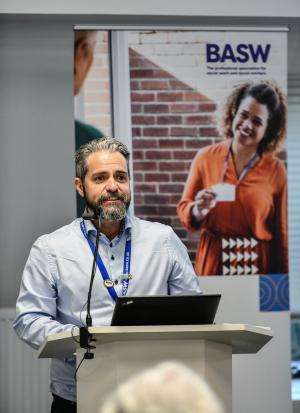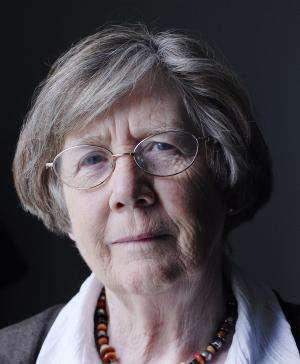Bronson Battersby tragedy underlines need to invest in family support, not scapegoat social workers

The Bronson Battersby tragedy reinforces the need for investment in early intervention services for families, a leading children’s campaigner has said.
Anne Longfield, England’s former children’s commissioner and present chair of the Commission on Young Lives, said social services are currently “stretched to the limit” and as a result too focused on crisis intervention.
Meanwhile, the Social Workers Union and BASW's children and families expert group warned against scapegoating social work for government failings.
Longfield, who announced creation of a new thinktank called the Centre for Young Lives dedicated to improving the life chances of children, young people and their families, was speaking on Radio 4’s Today programme in wake of widespread shock over the death of two-year-old Bronson.
The toddler is believed to have died from starvation and dehydration in the care of his 60-year-old father Kenneth who suffered a heart attack over Christmas at his home in Skegness, Lincolnshire.
A social worker contacted the police on two occasions after getting no response when visiting the home on 2 and 4 January. Five days later the social worker forced entry via Kenneth’s landlord and discovered the dead bodies.
Lincolnshire County Council has launched a rapid review and Lincolnshire Police has referred itself to the Independent Office of Police Conduct.
Though unable to speculate on the specifics of the case, Longfield said: “We know that children’s services are absolutely stretched to their limit in terms of the huge increase in demand but also the resources that are very, very strained.
“Ultimately that means people are doing very difficult jobs and the system is leaving far too much to crisis point and there isn’t that help early on to work alongside families which you may find could have helped dramatically here.”
England’s Independent Review of Children’s Social Care called for a “revolution in family help” backed by £2 billion.
It recommended the creation of family help teams located in community settings, such as schools and family hubs currently being rolled out by the government.
However, in its response to the review, the government only committed £200 million over two years.
Longfield said: “It is not just a case of money, it is what you do with that money. Now we are in a really damaging cycle where more and more money is being spent on fewer and fewer children at higher and higher cost and that is only going one way: it is not sustainable.
“What we need to do is reset the system to working with families earlier. That is what the outcome of the government’s owned commissioned review said by Josh MacAlister two years ago.
“It isn’t sustainable, we are just going to get more children going to need help at crisis point unless we invest early on when families and children first need that help.”
The Department for education is testing a new approach to family help at seven local authorities as part of a £45 million pathfinder programme. They will be evaluated for effectiveness over the next five years before being further rolled out.
Zoé Billingham, a former inspector of constabulary, said a lack of effective multi-agency working had been a problem for “for decades” and needed to be addressed.
She added: “We know what needs to happen, we need to put police and social workers together in a room, have open access to each other’s information, share all of the intelligence, make decisions together, understand the family’s circumstances – and in an emergency respond well.”
While the full facts behind Bronson’s death and the actions of professionals has yet to be established, services have already come under fire.
Matt Warman, Conservative MP for Boston and Skegness, said: “It does seem as though both the police and social services already knew both the father and Bronson.
“For that to not have secured his safety is clearly a failing on several levels.”
In an interview with The Sun, Bronson’s mother Sarah Piesse squarely placed the blame on social services.
She said: ““If social services had done their job Bronson would still be alive.”
However, his sister Melanie Battersby told BBC Breakfast: “I don’t place any blame at all on them.
“I believe that social services and the police did what they could within the powers that they had and the information that they were given."
Heather Sandy, executive director for children's services at Lincolnshire County Council, said: "This was a tragic incident, and we are supporting the family at this difficult time.
"We are currently carrying out a review of the case alongside partner agencies to better understand the circumstances, and we await the results of the coroner's investigations as well.
"Our thoughts are with the family and friends of those involved."
She said the social worker involved is being supported by the local authority.
A response to the Bronson Battersby tragedy from Calum Gallacher, assistant general secretary of the Social Workers Union
Bronson Battersby’s death has stunned the nation. For many people it will be inconceivable as to how this could happen in today’s society. For his mother, Sarah, I can barely comprehend the despair and abject grief likely engulfing her at this moment and I hope she is receiving support.

From what I have read the social worker visiting did everything she possibly could to ascertain the welfare of Bronson. In her professional dedication she acted appropriately, and now we must await the outcome of the rapid review process before critically questioning facts and events relating to individual circumstances and systems in place.
After every child death there is commentary that services need to learn – I would like to suggest it is the leaders of the country who need to learn.
Social work has always been a highly challenging profession, however the lack of recognition of the validity and ability of social workers to support people to attain better life outcomes is greatly undervalued, when compared with other public services.
SWU and BASW have actively called on the government to end austerity, and to recognise the impact this 14-year agenda has had on social services for children and adults. Austerity has decimated social work and social care. We are at all time high levels of attrition and staff vacancies UK-wide, and this only compounds the difficulties people experience.
Until the government recognise the impact of such a class-biased agenda, we will continue to see significant risks associated with socio-economic deprivation, with more children and adults forced to live in deep poverty which renders any person more vulnerable.
This government has created an all-new working-class poor, which traverses beyond the working classes. Families are being confined to intergenerational poverty, with vast ramifications for future physical and mental health, educational attainment, and living standards. This will only increase the need for service interventions and costs across multiple public agencies.
Social work is traditionally a helping profession which supports people to navigate difficult life circumstances and prioritises public safety. But severe underfunding of social work has created barriers to helping people at earlier points. We need this government and the next to commit to adequate investment in services so we can work proactively and preventatively.
A response from June Thoburn and Rick Hood, co-chairs of BASW England's children and families group
Until we learn more of the circumstances surrounding the horrific and distressing death of Bronson Battersby and his father Kenneth, now is not the time to do any more than express our heart-felt sadness and pass on condolences to his mother Susan, his sister and other family members – and neighbours who knew and cared about them both.

Our thoughts go out too to the social worker, her team members and other professionals who will have come to know Bronson and Kenneth and been deeply shocked and distressed by their deaths.
The language we use around such events is important, especially at this early stage when everyone who is touched by the tragic losses is feeling so emotionally raw. The term ’vulnerable’ has been used. As professionals we perhaps use it too often and fail to be clear that a child assessed as ‘in need’ – as was Bronson – is part of a family living through often complex difficulties for which they or others who know them well have requested a social-work-led service.
As far as we can tell, this appears to have been a tragic accident and we greatly regret that it has been taken by some, including the media who should know better, as an occasion to look for an individual or agency in public services to blame.
Bronson’s sister Melanie has publicly said that she sees no reason to blame social workers or the police, and we want to thank her for her measured and level response.
When the rapid review has reported, we will have more to say. The only point we wish to make now is to emphasise that the majority of children in need and their families receive help and support on a voluntary basis, so that whatever services social workers are asked to provide are agreed to by those who receive them.
While we must await the local authority’s review of this tragic case, everything we have heard so far indicates that the social worker’s visits, and whatever help she was able to provide, were in line with what was asked for by Kenneth Battersby.
Social workers amongst us who work with children and families will be putting ourselves in the shoes of a fellow social worker who most likely would have thought about this father and son as she enjoyed her own Christmas break.
On getting back to work, we would have (as, apparently, she did) been in touch with Kenneth, to arrange to see them, hear how their Christmas had been and perhaps check out whether they had all that was needed for Bronson to get back to nursery.
Bronson was not, as some commentators have in accusing tones stated, under the care of children’s services. He was in his father’s care and receiving help from a social worker and no doubt other colleagues because of difficulties and hardships they were living through.
We welcome the editorial in The Guardian and some of the media coverage explaining to members of the public and politicians that there should be no rush to judgement on this matter.
Children’s services in England are under huge and unsustainable pressure, making it ever harder for them to respond in a consistent and timely manner to the children needing their help. At the same time, families themselves are finding it increasingly hard to ensure their children lead the fulfilling lives to which they have a right.
Addressing these fundamental policy problems will do more to prevent future tragedies than will apportioning blame and seeking scapegoats. The BASW England children and families group members are responding to government moves to implement the recommendations of the Independent Review of Children’s Social Care. Central to our work is how to make sure that community-based support and appropriate assistance to families assessed as ‘in need’ is available to all those who have a moral and legal right to it.
